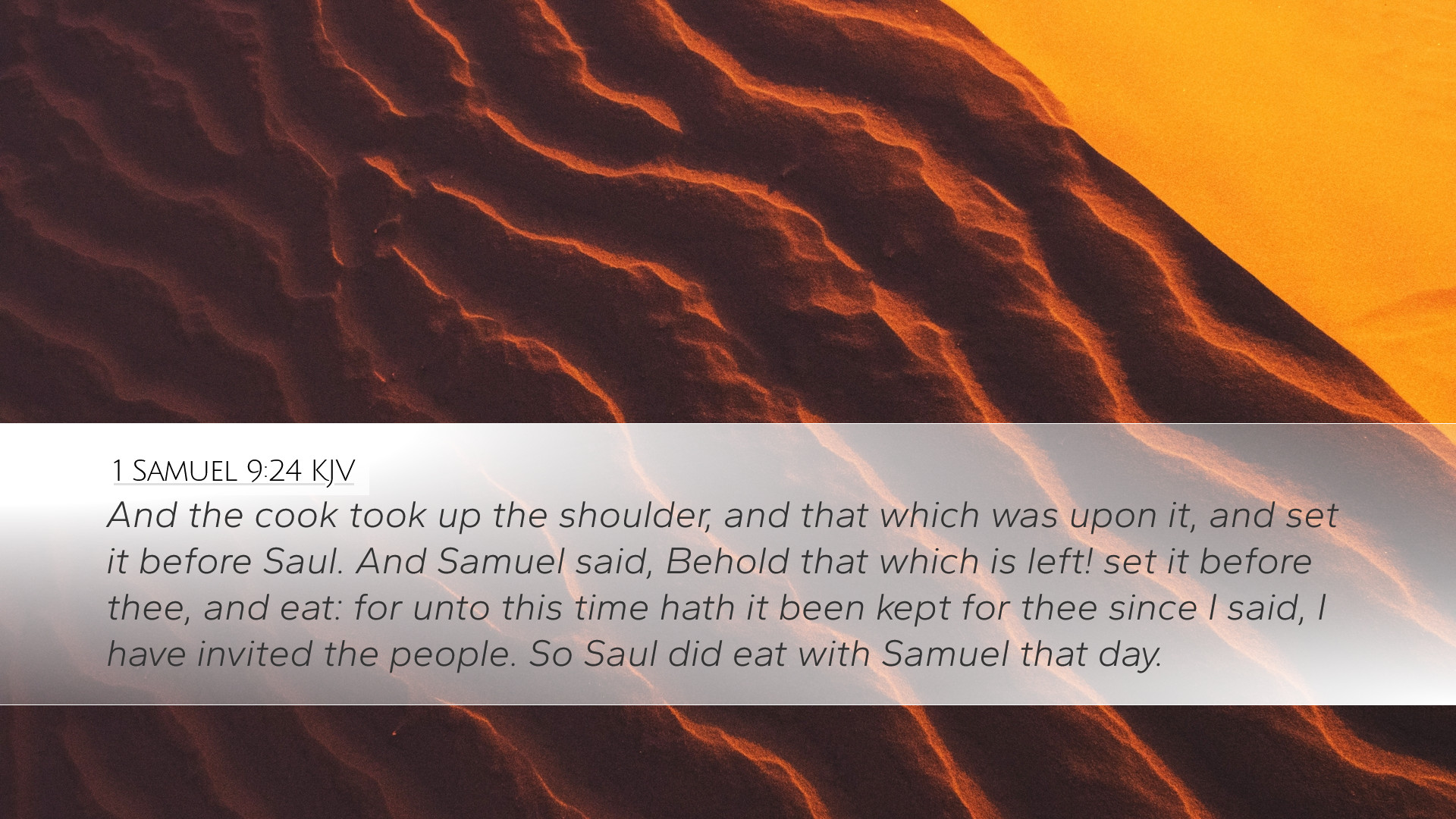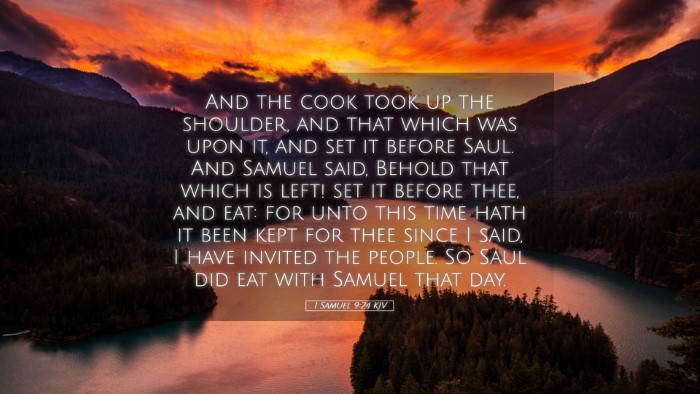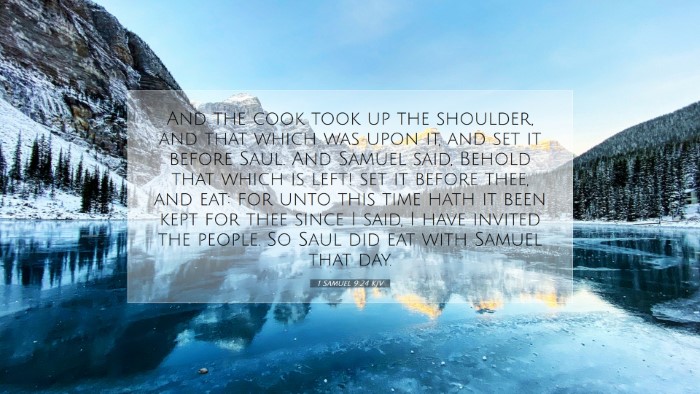Commentary on 1 Samuel 9:24
Verse: "And the cook took up the shoulder, and that which was upon it, and set it before Saul. And Samuel said, Behold that which is left! set it before thee and eat: for unto this time hath it been kept for thee since I said, I have invited the people." (1 Samuel 9:24, KJV)
Contextual Overview
This verse marks a pivotal moment in the narrative concerning Saul’s anointing as the first king of Israel. The preceding chapters set the stage, detailing the people's demand for a king, and God’s response through Samuel. As this chapter unfolds, we see the divine orchestration that leads to Saul being chosen. The act of setting the shoulder before Saul is deeply symbolic, carrying theological implications that resonate throughout the biblical text.
Insights from Commentaries
Matthew Henry's Commentary
Henry emphasizes the importance of the meal shared between Samuel and Saul. He notes that food, especially in the biblical context, often signifies fellowship and divine provision. The shoulder of the animal, being a prime cut, indicates honor bestowed upon Saul as he is chosen for a significant role in God’s plan.
- Significance of the Shoulder: The shoulder is typically thought to symbolize strength and leadership. Henry connects this to the expectations of Saul's kingship, suggesting that God’s choice of Saul is accompanied by divine support, granting him the strength necessary for his task.
- Highlighting God’s Timing: Henry notes that the meat was reserved specifically for Saul. This detail underlines that God's plans are precise and intentional. The invitation of Saul to partake of the meal is not random but is part of God’s larger narrative of establishing kingship in Israel.
Albert Barnes' Commentary
Barnes brings out the implications of Saul's eating the portion that was prepared for him. He suggests that this act was not merely about food but about Saul's acceptance of his calling and the responsibilities it involves. There is a deeper covenantal element at play here.
- Covenantal Meal: In biblical tradition, sharing a meal is often part of covenant-making rituals. By sharing the portion with Saul, Samuel affirms Saul’s future role and legitimizes his kingship before God and the people.
- Divine Providence: Barnes highlights the principle of God’s providence in arranging events so that they align with His will. The careful preparation of this meal reflects God’s sovereignty at work, indicating that nothing in Saul’s journey is left to chance.
Adam Clarke's Commentary
Clarke focuses on the cultural significance of the meal and its ceremonial aspects. He views this passage through a lens of hospitality, which was a crucial aspect of ancient Near Eastern culture. The act of inviting Saul to eat brings a communal aspect to the solitude of Saul’s journey.
- Cultural Hospitality: Clarke posits that sharing the shoulder with Saul not only signifies acceptance but reinforces communal ties as Saul transitions into leadership. The invitation symbolizes acceptance by the community, as Samuel represents the prophetic authority in Israel.
- Call to Leadership: Clarke underscores that the meal serves as a transition point for Saul. It reinforces that leadership comes with both privilege and responsibility. Eating this special portion is symbolic of Saul accepting the heavy burdens that come with kingship.
Theological Reflections
From the combined insights of these commentaries, several theological themes emerge that are vital for understanding this text:
- The Sovereignty of God: The orchestrated nature of events leading to Saul’s anointing underscores God’s sovereignty. It reminds readers that God meticulously plans and executes His will, often through ordinary events like a meal.
- Leadership and Responsibility: Saul's acceptance of the shoulder highlights the dual nature of leadership. It involves receiving God’s blessings and understanding the weight of the responsibilities leaders carry for their people.
- Community and Covenant: The act of eating together implies a covenantal relationship not only between Samuel and Saul but extending to the nation of Israel. It reinforces the idea that leaders must maintain a vital relationship with both God and their community.
Practical Applications
For pastors, students, and theologians, this verse offers practical applications that can be explored in preaching, teaching, and personal study:
- Understanding Divine Calling: Reflect on God’s specific calling in your life, considering how divine guidance often comes through seemingly mundane events.
- Fostering Community: Encourage fellowship within your congregation, recognizing the power of shared meals and the relationships they nurture, which can enhance community life.
- Embracing Leadership Responsibilities: Acknowledge the responsibilities that accompany any leadership role, ensuring that leaders are spiritually nourished to guide others effectively.
Conclusion
The meal described in 1 Samuel 9:24 serves as a profound moment of transition in Saul’s life and the life of Israel. By drawing from the insights of recognized biblical scholars, we gain a deeper understanding of the theological implications and practical applications of this passage. Thus, as a community of faith, both leaders and congregants are called to recognize God’s sovereignty, embrace their communal responsibilities, and live out the covenant entrusted to them.


